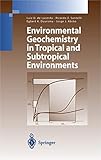Environmental geochemistry in tropical and subtropical environments [Libro electrónico] / editores: Luiz Drude de Lacerda, Ricardo Erthal Santelli, Egbert K. Duursma, Jorge João Abrão
Lacerda, Luiz Drude de [editor] | Erthal Santelli, Ricardo [editor] | K. Duursma, Egbert [editor] | João Abrão, Jorge [editor].
Tipo de material: Libro
en línea Series Editor: New York, New York, United States: Springer-Verlag Berlin Heidelberg, c2004Descripción: xx, 384 página : ilustraciones, mapas ; 24 centímetros.ISBN: 3540425403; 9783662070604 (Online).Tema(s): Environmental geochemistry -- TropicsNota de acceso: Disponible para usuarios de ECOSUR con su clave de acceso Nota de bibliografía: Incluye bibliografía e índice (página 379-382 Número de sistema: 56535Contenidos:Mostrar
Resumen:
Libro
en línea Series Editor: New York, New York, United States: Springer-Verlag Berlin Heidelberg, c2004Descripción: xx, 384 página : ilustraciones, mapas ; 24 centímetros.ISBN: 3540425403; 9783662070604 (Online).Tema(s): Environmental geochemistry -- TropicsNota de acceso: Disponible para usuarios de ECOSUR con su clave de acceso Nota de bibliografía: Incluye bibliografía e índice (página 379-382 Número de sistema: 56535Contenidos:Mostrar
Resumen:| Tipo de ítem | Biblioteca actual | Colección | Signatura | Estado | Fecha de vencimiento | Código de barras |
|---|---|---|---|---|---|---|
| Libros | Biblioteca Electrónica Recursos en línea (RE) | Acervo General | Recurso digital | ECO40056535517 |
Incluye bibliografía e índice (página 379-382
1. Regional climate changes: where and how?.. 2. Palaeoenvironmental reconstruction based on lacustrine organic matter: examples from the tropical belt of south America and Africa.. 3. Catchment-lagoon-estuary-coast interactions of the patos-mirim system, south brazil.. 4. Relationships between simultaneous methane, nitrous oxide and carbon dioxide fluxes and surface soil humidity and temperature in the mata atlântica subtropical forest, brazil.. 5. Modern strategies for environmental sample preparation and analysis.. 6. The importance of assessing uncertainties related to linear calibration curves: a case study for flame atomic absorption spectrometry.. 7. Characterisation and sources of nonpolar lipids in aerosols over the city of Rio de Janeiro.. 8. Determining the provenience of prehistoric ceramic artefacts from the Amazon basin using geochemical tracers.. 9. Exploring the cation exchange capacity of massapé paulistana vermiculite for heavy metal removal from aqueous solutions.. 10. Variation of heavy metal content with depth in Sabana de Bogotá soils.. 11. Acid drainage of coal mining in cundinamarca department, Colombia.. 12. Mercury pollution in Ghana: a case study of environmental impacts of artisanal gold mining in sub-Saharan Africa.. 13. Assessment of water quality in the area of Colima volcano (Colima, Mexico.. 14. The pacific and Caribbean rivers of Colombia: water discharge, sediment transport and dissolved loads.. 15. Reactive processes of organic matter in the Amazon river.. 16. Distribution of organic carbon and nitrogen in particulate, colloid and dissolved phases from the Amazon river system.. 17. Relationship of metal contaminants with acid-volatile sulphides (AVS in tropical estuarine sediments: potential influence on metal distribution and bioavailability.. 18. Modelling of circulation and water exchange in a hypersaline coastal lagoon: lagoa de araruama, Brazil..
19. Sediment oxygen and nutrient fluxes in three estuarine systems of south-eastern brazil.. 20. Hydrogeochemical characterisation of groundwater saline intrusion in the western shore of ceará, north-eastern brazil.. 21. Sepetiba bay: a case study of the environmental geochemistry of heavy metals in a subtropical coastal lagoon.. 22. Overview of the biogeochemical controls and concerns with trace metal accumulation in mangrove sediments.. 23. Effects of bioturbation of the sandprawn callichirus major on nutrient fluxes from sediments of a subtropical sandy beach, brazil.. 24. Trace metals occurrence and geochemical distribution in sediments from mar chiquita coastal lagoon, Argentina.. 25. Geochemistry and spatial distribution of heavy metals in continental shelf sediments from two offshore oil fields in south-eastern brazil.. 26. Geochemistry of continental shelf sediments of the ceará coast, north-eastern brazil.. Subject Index
Disponible para usuarios de ECOSUR con su clave de acceso
Three symposia on environmental geochemistry in tropical countries, held in Niter6i, Brazil (1993), in Cartagena, Colombia (1996) and in Nova Friburgo, Brazil (1999), made it very clear that tropical geochemistry is of world standard and fast increasing in multi disciplinarily and impact on important geochemical paradigms. It has additionally strong links with the economy of tropical countries, such as mining and industrialisa tion and is in full development for treating environmental problems caused by human activities of urban or industrial origin. We must compliment Prof. Jorge Abriio and his colleagues in Brazil and Dr. Gloria Prieto and her colleagues in Colombia for these initiatives. The participation of respectively 180 and 150 scientists, coming from 15 different countries for the first and second symposia, has shown that a large interest exists for tropical environmental geochemistry. It also demonstrates the necessity to understand tropical environmental problems. The organisation of a large international symposium is not possible without the assistance of state and federal authorities, for which those of Brazil and Colombia have to be complimented. The 3rd Symposium on Environmental Geochemistry in Tropical Countries was the last of the series and was attended by 22 countries and 170 participants and treated a number of related environmental and economic problems. eng
Disponible en línea
Disponible en formato PDF
Subscripción a ELSEVIER 26 de diciembre del 2013
